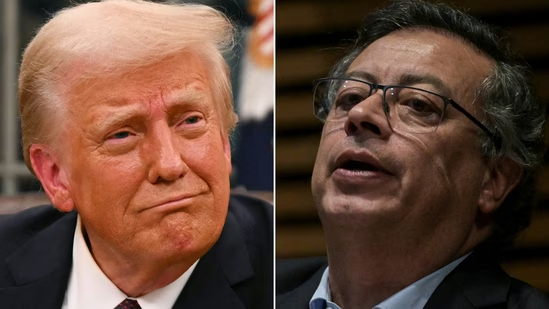The White House scored a win in its standoff with Colombia, just hours after President Donald Trump threatened heavy tariffs and other sanctions over Colombia’s refusal to accept deported migrants from the U.S.
The two countries, long-time partners in the fight against drugs, clashed over the issue of deportations and imposed tariffs on each other’s goods as a show of force. It was a warning from the U.S. to other countries that might try to block Trump’s crackdown on illegal immigration.
Trump ordered tough measures, including 25% tariffs on all Colombian imports, which would rise to 50% in a week, along with visa restrictions and other retaliatory steps. This came after Colombian President Gustavo Petro refused to accept two U.S. military flights carrying deported migrants, criticizing Trump for not treating immigrants with dignity. In response, Petro also imposed a 25% tariff increase on U.S. goods.
Trump argued that Petro’s decision put U.S. national security at risk by blocking the deportation flights.
White House Press Secretary Karoline Leavitt announced that Colombia had agreed to all of Trump’s demands, including accepting all deported Colombians, without delay or limitation, even on U.S. military planes. Leavitt added that the tariff measures would be put “on hold” for now, but Trump would keep visa restrictions on Colombian officials and increase customs inspections on Colombian goods until the first batch of deported Colombians were safely returned to their home country.
The Colombian government said the issue had been resolved and Petro reposted the White House’s statement on X (formerly Twitter). The Colombian government also offered its presidential aircraft to help return the migrants who were supposed to arrive earlier on the U.S. military flights.
Meanwhile, U.S. Secretary of State Marco Rubio announced that visa restrictions would be imposed on Colombian government officials and their families who were involved in blocking the deportation flights. This came in addition to the U.S. suspending visa processing at the U.S. Embassy in Bogotá.
Petro had earlier said Colombia wouldn’t accept the deportation flights until the U.S. created a protocol that would treat deported migrants with more “dignity.” He made the announcement in a couple of posts on X, one of which included a video showing migrants being deported to Brazil while restrained.
Historically, Colombia has been one of the U.S.’s closest allies in Latin America, but the relationship has been strained since Petro, a former guerrilla fighter, became the country’s first left-wing president in 2022 and sought to distance Colombia from U.S. influence.
Between 2020 and 2024, Colombia accepted 475 deportation flights from the U.S., making it the fifth-largest recipient behind Guatemala, Honduras, Mexico, and El Salvador. In 2024 alone, Colombia took in 124 deportation flights. Colombia also began accepting U.S.-funded deportation flights from Panama last year.




